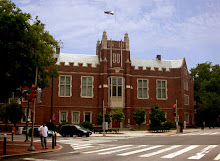
By Taylor Wemmer
Some activists are into politics. Others are into the environment. Morgan Seag is into natural disasters.
I sat down with Seag, a 21-year-old University of Pennsylvania senior recently (10/25) in her apartment’s living room. Movie posters of Disney classics hung on the walls and Halloween candy was piled high on the kitchen table.
Although it was clear she loved fairy tales, our ensuing conversation made it clear that she loved natural disasters more.
Seag is a co-founder and executive board member of NO REST, an acronym for New Orleans Recovery Efforts for a Stronger Tomorrow.
NO REST, started in the spring of 2006, is a Penn undergraduate student group with the goal of fundraising for and sending volunteers to the city of New Orleans. Hurricane Katrina, which hit New Orleans hard in late August of 2005, was one of the worst hurricanes to hit the area in years and had left thousands of residents with absolutely nothing.
“I did not intend to become an advocate for the Gulf Coast but I am one and I care about it a lot,” said Seag. There is currently a “lack of volunteers and lack of media coverage, and therefore, a lack of national interest.
It is so important that there are efforts being made on this campus" to continue the aid effort in New Orleans.
In the spring of her freshman year, Seag volunteered with a group of students to go to Sri Lanka to help the country rebuild after the Asian Tsunami hit the country in December 2004.
It is so important that there are efforts being made on this campus" to continue the aid effort in New Orleans.
In the spring of her freshman year, Seag volunteered with a group of students to go to Sri Lanka to help the country rebuild after the Asian Tsunami hit the country in December 2004.
“I was fascinated by the power of nature. [I asked myself:] how do humans navigate around these forces we cannot control? How can we make the best of these situations? How can we help?” said Seag.
Her fascination with natural disasters was born long before Hurricane Katrina and the Asian Tsunami. It all started at the age of eight in Westwood Hills, Kansas, a suburb of Kansas City.
She and her family only lived in Kansas for six months, but it was long enough for the third-grader Seag to develop a secret fascination with tornadoes.
“I always kept a plastic bag of toys near the basement door [just in case.]” she said. “I was always hoping there would be one when I was there.”
Although she never saw one in person, she never forgot that dream. Her senior year ambition recorded in her high school yearbook was to “see a tornado, a volcano, and Antarctica.”
Why Antarctica?
She thought that that would be a more realistic route for her future as an environmental scientist.
Despite this goal, her college career steered her in a different direction. Seag also harbored an interest in international affairs and that is ultimately where her life has taken her, she said.
When the tsunami hit in 2004, she knew she had to go. "This was third grade Morgan shouting out ‘Take me! Take me!’ So I took me to Sri Lanka!” she said.
What she found out while helping rebuild homes in Sri Lanka was that there was a lot more to disaster relief than just humanitarian aid. There were lots of politics involved.
Realizing the role politics played in disaster relief, she declared her major in the field of political science. The tsunami also influenced her in terms of what she would volunteer for next.
“When Katrina hit, it was so clearly the next thing I would be doing,” said Seag.
She and a couple of other students who had traveled with her to Sri Lanka decided to co-found a disaster relief organization for Katrina in 2006. Although they considered making a relief organization that raised funds for all kinds of future crises, they ultimately decided on focusing it solely on New Orleans.
“It was domestic, close to our hearts, and something that we felt we could really make a tangible effect on,” said Seag.
NO REST has been very effective so far in its efforts to reach out to students. They sent five groups of Penn undergraduates to New Orleans the summer of 2006 and raised money to sponsor a Head Start classroom for the holidays later that year.
They have also partnered with FLINOA, Fox Leadership in New Orleans, Louisiana, which, in turn, is a part of Penn’s Provost’s umbrella organization for sending aid to the Gulf Coast.
FLINOA provides a significant amount of funding for NO REST, as well as supplying important connections and infrastructure to which undergraduate groups do not have normally have access.
“Penn is really involved in an incredible way down there. Our goal is to keep future undergraduates aware of and caring about the city. It’s not just about humanitarian aid that [is needed right away], [it’s about] the long term recovery of a city,” said Seag.
She is excited about continuing her efforts to support this city and no matter where her future life might take her, Seag knows “that disaster relief and the city of New Orleans will [always] remain a part of where [she] comes from.”


